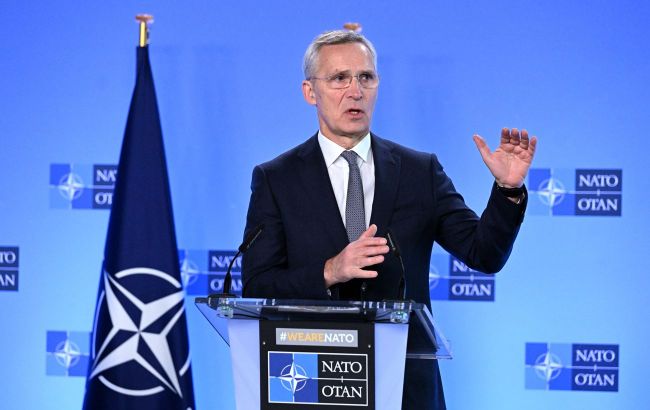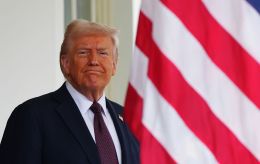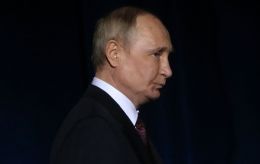NATO chief to meet Trump allies to lobby for Ukraine aid
 Photo: NATO Secretary-General Jens Stoltenberg (Getty Images)
Photo: NATO Secretary-General Jens Stoltenberg (Getty Images)
On Monday, January 29, North Atlantic Treaty Organization (NATO) Secretary-General Jens Stoltenberg arrived in the United States for a visit. There he plans to meet with representatives of the Joe Biden administration, congressmen, and associates of former President Donald Trump to lobby for the approval of an aid package worth more than $60 billion for Ukraine, Politico reports.
The outlet notes that on Wednesday, January 31, the Alliance chief will deliver a speech at The Heritage Foundation, a conservative think tank closely associated with Trump. The visit comes at a time when the former president and his cronies are pressuring Republicans to reject a $111 billion aid package that includes aid to Ukraine, Israel, and Taiwan because of disagreements with the White House over the fight against illegal migration on the U.S.-Mexico border.
"Stoltenberg will likely find a skeptical audience at Heritage — which has advocated for Europe to take the lead in supporting Ukraine while the U.S. shifts its focus to the Indo-Pacific," the agency says.
Visit agenda
On Tuesday, January 30, the NATO Secretary-General will visit Congress to meet with House Speaker Mike Johnson, House Democratic Minority Leader Hakeem Jeffries, Senate Republican Minority Leader Mitch McConnell, and other representatives. The Senate may soon release the border policy agreement. However, some House members are calling it dead on arrival.
Later this week, Stoltenberg will travel to the Lockheed Martin missile plant in Alabama, where he is likely to repeat President Joe Biden's argument that jobs in the U.S. defense industry are directly dependent on U.S. aid to Kyiv.
"These messages will be aimed at the isolationist wing of the Republican Party and lawmakers who are debating Biden's months-long request for assistance to Ukraine. The situation in Ukraine remains complicated, as Kyiv and Moscow appear to be at a stalemate, with neither side able to muster enough fighting power to make significant breakthroughs on the issue," Politico writes.
Long-term war and Ukraine's successes
A NATO military official anonymously tells the outlet that the Alliance does not expect any significant changes on the front line.
"We all agree that Ukraine's counteroffensive did not bring all the expected results. However, this does not mean Russia is winning, despite Russian propaganda. The war at this stage is a "long-term engagement" war, which is linked to the demonstration of American leadership, which we all support and encourage," the official says.
At the same time, Stoltenberg notes some significant successes, which he will report on this week as a prelude to the celebration of the Alliance's 75th anniversary in Washington in July.
In particular, the Secretary-General plans to talk about how NATO countries are increasing defense production and trying to conclude deals with Ukrainian arms manufacturers to begin rebuilding Kyiv's capacity to produce its weapons - a message of self-reliance that is sure to find supporters in Washington.
"There seems to be a lot of interest from both the Ukrainian side and the American (defense) industry in what they can do to work with Ukrainians," Mira Resnick, head of the U.S. State Department's Office of Regional Security and Arms Transfer, tells Politico.
"What I’ve heard from industry is that they are really impressed with the Ukrainians, and that there is real opportunity there because of what the Ukrainians have been able to accomplish and the idea of bending the technology to their will,” to produce their own drones and retrofitting western missiles and rockets on their Soviet-era aircraft and missile launchers," Resnick says.
NATO's support for Ukraine
On Monday, January 29, Jens Stoltenberg met with U.S. Secretary of Defense Lloyd Austin. The parties discussed assistance to Ukraine, including the criticality of rapidly increasing defense production.
Recently, the Alliance Secretary-General said that NATO and EU allies should step up ahead of the second anniversary of Russia's invasion of Ukraine and provide more assistance to Kyiv.
According to the Institute for War Studies, the recent shelling of infrastructure facilities in Russia is the result of Ukraine's first secret development of its weapons. At the same time, Kyiv needs to solve many problems to establish mass production of such weapons, especially with the use of modern Western technologies.

